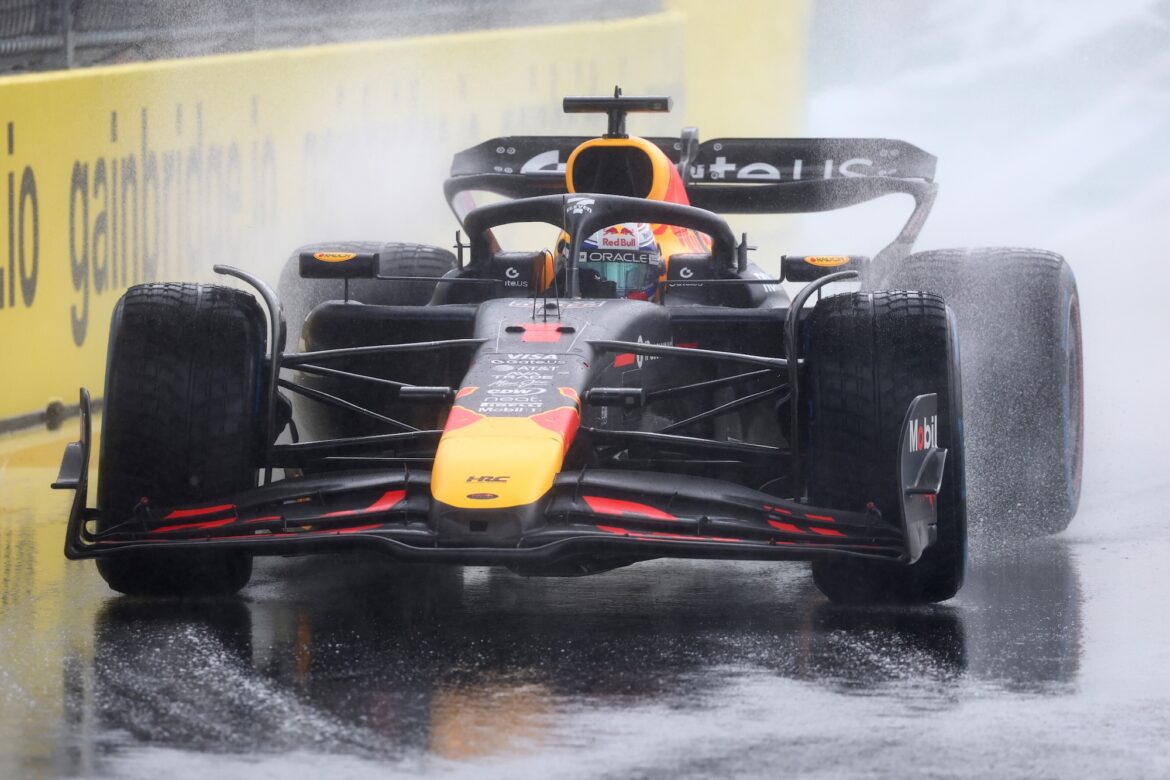As speculation continues to swirl about the potential departure of Max Verstappen from Red Bull Racing at the end of the current Formula 1 season, former F1 driver Christijan Albers has weighed in on the complexities surrounding a possible move to either Mercedes or Aston Martin. The Dutch driver started from pole position at the Miami Grand Prix but ultimately finished in fourth place after being overtaken by both McLaren cars and George Russell of Mercedes. Despite this outcome, Albers noted several positive aspects regarding Red Bull’s performance over the weekend.
In a recent episode of a podcast by the Dutch newspaper De Telegraaf, Albers highlighted Verstappen’s remarkable ability to extract maximum performance from his car during qualifying sessions. He stated, “You can see how much Max gets out of the car. I find that impressive.” He further emphasized that Verstappen’s speed in high-speed corners significantly outperformed that of the McLaren vehicles. “That’s where the Red Bull car really shows its strength,” Albers added.
Albers also touched upon Toto Wolff’s interest in possibly recruiting Verstappen for Mercedes, especially following the events in Miami. “On Friday and Saturday, Wolff might have thought, ‘Why do I need Verstappen?’ with Russell consistently maximizing his performance and Antonelli demonstrating speed and talent by securing pole position in the Sprint race. But then you see Verstappen in action on Sunday, fighting until the end, and your perspective changes. You think, ‘It would be fantastic to have this guy on the team,'” he remarked.
However, the former driver was quick to point out that transitioning teams is not as straightforward as many analysts might suggest. “I think analysts are oversimplifying things. We need to remember that there are contracts in place, and breaking a contract isn’t easy. So, it won’t be that simple,” Albers concluded.
### The Complexity of Team Transfers in Formula 1
In the high-stakes world of Formula 1, team transfers are often a topic of intense discussion, especially when it involves a driver of Verstappen’s caliber. The intricate web of contracts, team dynamics, and the financial implications make any potential move a complicated affair. Verstappen’s current contract with Red Bull is likely to have various clauses that could impact his ability to switch teams.
The nature of contracts in Formula 1 is multifaceted. Teams invest significant resources into nurturing their drivers, and in return, they expect loyalty and performance. Therefore, if a driver like Verstappen were to consider moving to another team, it would not just be a matter of personal desire or ambition but also involve negotiations that can stretch over months, if not years.
Moreover, the competitive landscape of F1 plays a crucial role in these decisions. Teams like Mercedes, with their rich history of success, are often seen as desirable destinations for top drivers. However, the current structure of the team, their existing drivers, and their strategic direction would all factor into any discussions. For Verstappen, moving to Mercedes could mean not just a shift in team culture but also a change in competitive dynamics.
### The Role of Performance in Contract Negotiations
Performance on the track is a vital element that influences contract negotiations in Formula 1. Albers’ comments about Verstappen’s performance during the Miami GP are a testament to this. His ability to extract maximum performance from his car, especially in high-speed corners, showcases why he is considered one of the best drivers in the sport. This kind of performance not only enhances his marketability but also strengthens his negotiating position.
When a driver consistently delivers impressive results, it sends a clear message to other teams about their value. For instance, after a weekend where Verstappen performed well despite not securing a win, teams would be keen to assess his potential. Wolff’s changing perspective on Verstappen after witnessing his determination in Miami illustrates how a single performance can impact a team’s interest.
### The Importance of Team Dynamics
Team dynamics also play a significant role in the potential for a driver’s transfer. The existing relationships among team members, the drivers’ compatibility, and the overall environment within the team can greatly influence the decision-making process. For Verstappen, joining a team like Mercedes or Aston Martin would not just be about the car’s performance but also about how well he would fit into the team culture.
Albers’ insight that Wolff’s interest in Verstappen might have fluctuated based on the weekend’s performances underscores how crucial team dynamics are. If Verstappen were to join Mercedes, he would need to establish a working relationship with Russell, who has proven to be a strong competitor in his own right. The ability to work collaboratively with teammates while also competing for the top position is essential for any driver in Formula 1.
### The Impact of Fan and Media Perception
In the age of social media and instant news, fan and media perception can also significantly influence a driver’s career decisions. The constant scrutiny and analysis from fans and pundits create an environment where drivers must be acutely aware of their public image and marketability. A move to a renowned team like Mercedes would not only elevate Verstappen’s status but could also enhance his brand, attracting sponsorship and fan engagement opportunities.
Albers’ reflections on the media’s portrayal of Verstappen and his performance highlight how public perception can impact team decisions. If the narrative shifts to favor Verstappen as a pivotal player for a team’s success, it could prompt quicker negotiations and decisions from team management.
### Conclusion
The possibility of Max Verstappen transferring to another team, such as Mercedes or Aston Martin, is laden with complexities that extend beyond mere speculation. The interplay of contracts, performance, team dynamics, and public perception all contribute to a multifaceted narrative that shapes the future of drivers in Formula 1. With the season continuing to unfold, fans and analysts alike will be watching closely to see how these factors play out and whether Verstappen will remain with Red Bull or explore new horizons in his racing career.
